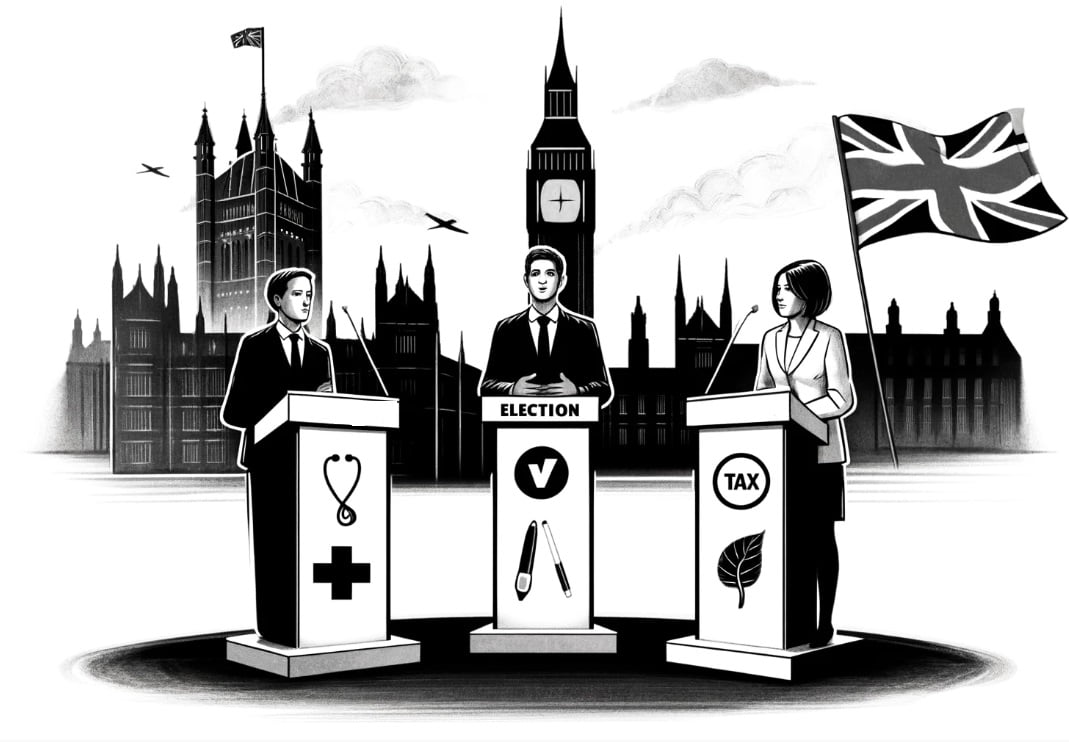As the UK gears up for the general election on July 4, political parties are unveiling their manifestos, outlining their visions for the country. This election is pivotal, offering the Liberal Democrats a chance to reclaim their status as the third-largest party in Westminster. Here’s a detailed look at the key pledges from the major parties: the Liberal Democrats, Labour, and the Conservatives, along with insights into other significant parties.
Liberal Democrats
The Liberal Democrats, under Sir Ed Davey, aim to re-establish themselves as a major force in UK politics. Their manifesto highlights:
- NHS and Social Care: Guaranteeing GP appointments within seven days, increasing GP numbers, and improving support for unpaid carers.
- Tax and Spending: Implementing a one-off windfall tax on oil and gas super-profits, abolishing the capital gains tax-free allowance, and reforming business rates.
- Economy: Promoting flexible working, developing a clean technology industrial strategy, and aiming to rejoin the Single Market.
- Environment: Transforming water companies into public benefit corporations, doubling wildlife habitats, and replacing Ofwat with a tougher regulator.
- Energy and Net Zero: Achieving net zero emissions by 2045, generating 80% of electricity from renewables by 2030, and planting 60 million trees annually.
- Education and Childcare: Providing mental health professionals in every school, increasing school funding, and reinstating the Erasmus Plus programme.
- Pensions and Welfare: Maintaining the pensions triple lock, reversing cuts to Universal Credit, and ensuring proper compensation for Waspi women.
- Policing and Crime: Restoring community policing, making misogyny a hate crime, and scrapping police and crime commissioners.
- Migration: Scrapping the Illegal Migration Act, allowing asylum seekers to work, and negotiating fast-tracked work visas.
- Defence: Reversing Army cuts, maintaining NATO commitments, and pursuing global disarmament.
- Housing: Building 150,000 new council homes annually and ensuring new homes produce zero emissions.
Labour
Labour, led by Sir Keir Starmer, focuses on addressing inequality and improving public services. Key points include:
- NHS and Social Care: Pledging two million more operations, scans, and appointments in the first year, training more doctors and nurses, and introducing specialist mental health support in every school.
- Tax: Closing inheritance tax loopholes for non-doms, cracking down on tax avoidance, and imposing VAT on private school fees.
- Economy: Aiming for the highest sustained growth in the G7, introducing tough fiscal rules, and investing in green projects.
- Environment, Energy, and Net Zero: Achieving clean power by 2030, establishing a publicly-owned energy company, and upgrading five million homes in five years.
- Education and Childcare: Overhauling the childcare system, recruiting 6,500 more teachers, and reforming student loan repayments.
- Defence: Boosting defence spending to 2.5% of GDP, committing to NATO and the nuclear deterrent, and creating a new armed forces commissioner.
- Pensions: Bringing back the lifetime cap on pension savings, maintaining the triple lock, and reviewing the pensions system for better value.
- Policing and Crime: Halving serious violent crime in 10 years, recruiting 13,000 more police officers, and reintroducing strengthened anti-social behaviour orders.
- Migration: Treating people smugglers like terrorists, creating a new cross-border police unit, and cutting the asylum backlog.
- Housing: Building 1.5 million homes, utilising “poor quality” green belt land, and setting a home ownership target of 70%.
Conservatives
The Conservative Party, under Prime Minister Rishi Sunak, emphasises economic stability and national security. Their manifesto includes:
- NHS and Social Care: Reducing NHS waiting lists, protecting the health service from funding cuts, and recruiting 300,000 doctors and 170,000 nurses by 2036-37.
- Tax and Spending: Reducing taxes on working families, focusing on National Insurance cuts, and potentially slashing inheritance tax.
- Economy: Focusing on reducing inflation, boosting growth, and bringing down national debt.
- Environment: Making tough pledges on cleaning up Britain’s waterways and potentially scrapping EU-era rules blocking new homes.
- Energy and Net Zero: Retaining the energy price cap, supporting nuclear power expansion, and reducing reliance on solar panels on farmland.
- Education and Childcare: Scrapping A-levels for a new Advanced British Standard, expanding free childcare, and addressing sex education and gender ideology in schools.
- Defence: Bringing back National Service for 18-year-olds, increasing the military budget, and maintaining support for NATO.
- Pensions and Welfare: Introducing a “quadruple lock” on pensions, ensuring pension thresholds stay ahead of the state pension, and cracking down on welfare spending.
- Policing and Crime: Cracking down on knife crime, increasing stop and search, and recruiting 20,000 more police officers.
- Migration: Tightening rules on dependants, building on the Rwanda plan, and potentially pledging a referendum on leaving the European Convention on Human Rights.
Other Parties
- Scottish National Party (SNP): Focuses on Scottish independence, improved healthcare, and environmental sustainability.
- Green Party: Emphasises climate action, renewable energy, and social justice reforms.
- UK Independence Party (UKIP): Stresses immigration control and reducing foreign aid.
The upcoming general election presents a critical choice for UK voters, with each party offering distinct policies and visions for the future. The manifestos reflect varied approaches to key issues like the economy, healthcare, education, and the environment, making this election one of the most significant in recent history.
Further Reading
